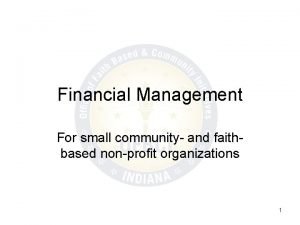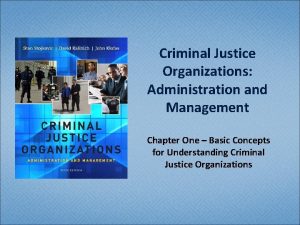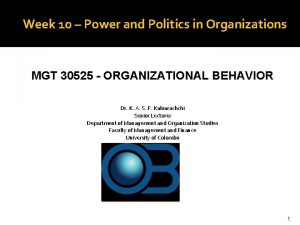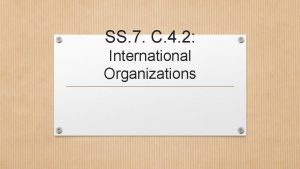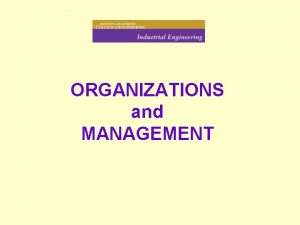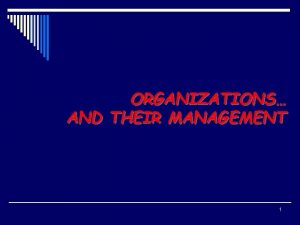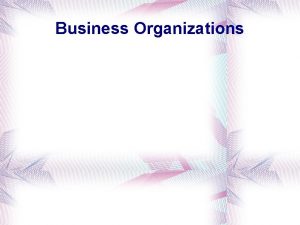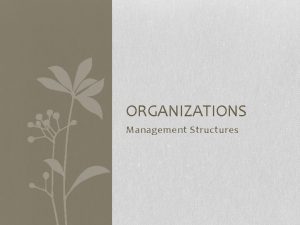CHANGE MANAGEMENT IN ORGANIZATIONS Change Definition Change is











- Slides: 11

CHANGE MANAGEMENT IN ORGANIZATIONS

Change- Definition • Change is something that presses us our comfort zone. Change is for the better or for the worst, depending on where you view it. Change has an adjustment period, which varies on the individual to individual and from organization to organization. • Change is needed when all the props and practices of the past no longer work.

• Change comes to business in many forms like merger, acquisition, divestiture, joint venture, technology implementation, organizational restructuring, or regulatory compliance • It can also come from new leadership, strategic decisions to change direction to position for growth or react to changing market conditions.

What is Organizational Change? Organizational change is about reviewing and modifying management structures and business processes. Small business must adapt to survive against bigger competitors and grow.

Organizational Change Management • Organizational change management includes process and tools for managing the people side of the change at an organizational level. These tools include a structured approach that can be used to effectively transition groups or organizations through change. • When combined with an understanding of individual change management, these tools provide a framework for managing the people side of change.

Organizational change comprises four main issues: - • Content • Contextual • Process • Criterion

NEED FOR ORGANIZATIONAL CHANGE üContent issues focus on the substance of contemporary organizational changes üContextual issues centre on the forces or conditions present in the external and internal environments of organizations. üProcess issues concentrate on the actions undertaking during the establishment of intended change. üCriterion issues on the other hand, tackle outcome usually evaluated in organizational change.

Set right the situation • Organizations often need to correct situations, which they believe require some adjustments or change. • For example, in recessionary market, an existing HR policy on variable pay may seem to be incorrect when it is based on the value of total sales. The organization may amend this with the fixed performance incentive till the market situation improves.

2. Seize opportunities to grow • New market opportunity may motivate an organization to build new capabilities by expanding their activities or through strategic alliance, identifying business partners. • For example, when political pressure in the U. S mounted against outsourcing to India, Infosys set up units in Canada to get U. S outsourced jobs and then routed these to their Indian Units.

3. Emerge as different entity • Often, organizations change to become more flexible. While adapting to new situations is essential, flexibility in operation or functions may also be required in special circumstance. • For example, developing strategic business unit based on product mix or type to make each product type an independent profit centre.

KEY ELEMENTS FOR SUCCESS IN ORGANIZATIONAL CHANGE 1. Plan for long-term • Broadly, a sound strategic vision rather than a specific detailed plan can help the organization to make reliable predictions 2. Empower people • Decision should be made at the operation level through delegation of power and responsibility. This can make the organizational change process much simpler, as with increased ability for problem solving, employees will volunteer for change.
 Attributes of change-capable organizations.
Attributes of change-capable organizations. Chapter 1 introduction to management
Chapter 1 introduction to management Financial management software for faith-based organizations
Financial management software for faith-based organizations Management in criminal justice organizations
Management in criminal justice organizations Youth organizations in great britain
Youth organizations in great britain Power and politics in organizations
Power and politics in organizations Voluntary health and welfare organizations examples
Voluntary health and welfare organizations examples Compare and contrast business organizations
Compare and contrast business organizations Guided notes international organizations
Guided notes international organizations Performance measurement in decentralized organizations
Performance measurement in decentralized organizations Performance measurement in decentralized organizations
Performance measurement in decentralized organizations Contemporary theory of management
Contemporary theory of management


